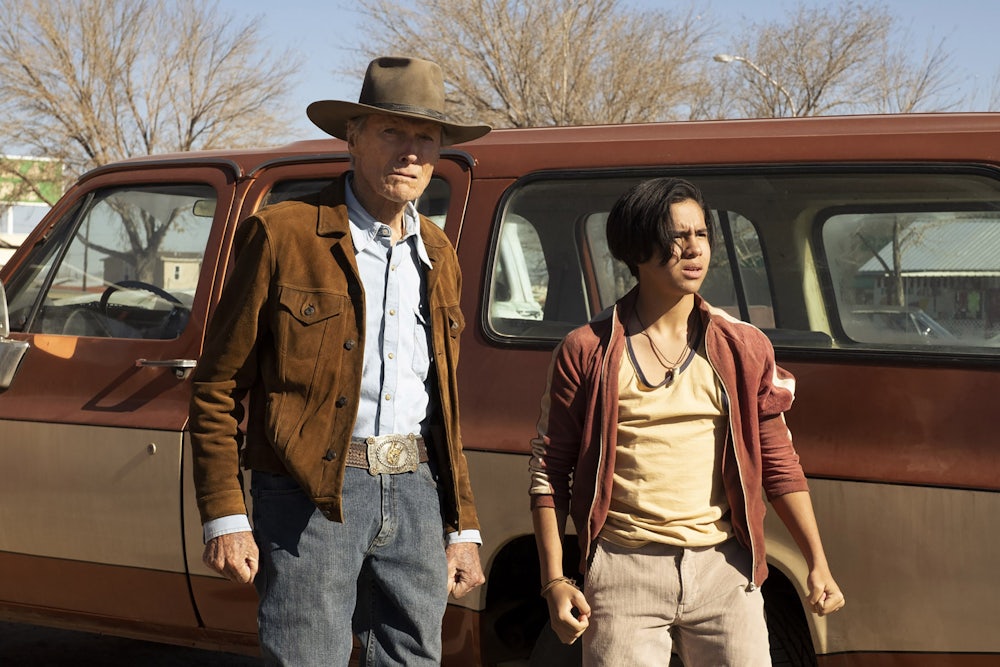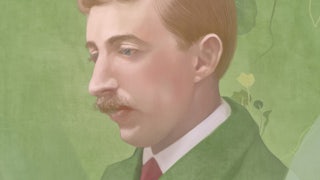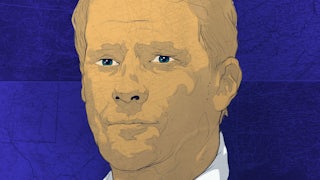In 1981, screenwriter Sonia Chernus reviewed a script acquired by the Malpaso Company, the film production house Clint Eastwood co-founded in 1967. The brutal violence and profanity of the script, titled The Cut-Whore Killings, galled Chernus. “We would have been far better off not to have accepted trash like this piece of inferior work,” she wrote to her boss. Undaunted, Eastwood read the script. It was indeed violent, and profane. He liked it. But he didn’t want to make it yet. “I took the script,” he told the American Film Institute in 2009, “and put it in a drawer. I figured, ‘Maybe I should be just a little bit older.’”
It wasn’t until 1992 that The Cut-Whore Killings was released, as Unforgiven. Eastwood, older and perhaps even wiser, played William Munny, a widowed Wild West outlaw, dragged out of retirement for one last job. He served as the film’s producer, director, star, and, arguably, subject. The film interrogated the sort of ready-made macho myths that Eastwood, via his own screen presence as A-list cowboy and big-screen outlaw, had come to embody.
Unforgiven was regarded as a consummate statement. The film won Best Picture at the 1993 Academy Awards. Eastwood also took Best Director honors (in characteristic understatement, he received his trophy and cooed, “This is pretty good. This is alright”). Its stark, unsparing, and wholly untitillating depictions of violence and self-sufficiency were ripostes to the body of work amassed by an actor-director-producer whose name is literally an anagram for “Old West Action.” Once a brave cowboy—or San Francisco police inspector—beholden to his own studied moral code, here Clint Eastwood was shivering in the rain, belting back moonshine, and shooting a helpless man sprawled on the floor. Unforgiven critiqued the enduring appeal of the Western genre, and so the foundational myths of America itself. More than another “revisionist Western,” it was the last word. Eastwood would never again saddle a horse on-screen. Until now.
Based on N. Richard Nash’s 1975 novel, Cry Macho sees Eastwood, 91, decked out in familiar liveries: cowboy boots, oversize belt buckles, a wide Stetson hat. Eastwood’s Mike Milo is not a lone gunman or cattle rustler but an aged rodeo star with a busted back. He’s dispatched by his boss (Dwight Yoakam) to retrieve his estranged son, Rafael (Eduardo Minett), from Mexico and bring him back to Texas. Like Unforgiven, it’s a film Eastwood initially passed on decades ago, believing that he was, as he recently told the Los Angeles Times, “too young for this.” The screenplay is by Nick Schenk, who also wrote 2008’s Gran Torino and 2018’s The Mule, films to which Eastwood lent his talents as director and star. Taken together, these films constitute a loose trilogy, making a virtue of the star’s weathering—and, by now, practically petrified—screen image, while riffing on the very legacy of that image.
If the Western was, for a long stretch, the genre through which America articulated its expansionist ambitions, then Eastwood was its post–John Wayne avatar: rougher, meaner, morally looser, but no less committed to exacting a familiar version of justice. (For all the talk of Eastwood’s “antihero” posture in his Westerns, he’s still the “good” in 1966’s The Good, The Bad and The Ugly.) Eastwood has followed his interest in America’s global performance of itself beyond the high plains, honky-tonks, and blunted bluffs of the American West. His war films took him further afield: to the black sands of Iwo Jima (with the 2006 diptych Flags of Our Fathers and Letters to Iwo Jima), the bombed-out interiors of post-9/11 Iraq (2014’s American Sniper), to Communist Grenada (1986’s Heartbreak Ridge), and even aboard a high-speed train racing across Western Europe (2018’s The 15:17 to Paris). In his latest, Eastwood heads to Mexico, still a contested frontier of American empire.
Cry Macho offers plenty for people content to watch Eastwood growling through clenched teeth, the image of the hot-blooded (great) grandpa. Opening in 1979, when Eastwood himself was still an icon of American machismo and a top box-office draw, Cry Macho recasts the star as he is now: old and hunched, a shadow of his former self. A busted back has led to a pill addiction, and the film begins with him being fired from his job as a ranch hand for chronic tardiness and more generalized lethargy. “It’s time for new blood,” Yoakam’s character says. It’s a line that, one imagines, the nonagenarian Eastwood has heard plenty of times by now.
But Mike, like Eastwood, is stubborn, and desperately bound to utterly oldfangled bonds of male chivalry. So when the same boss who cans him asks him to slip into Mexico and return his son, Mike agrees. After all, as his boss frames it, “He’ll know the minute he sees you, you’re a real cowboy. He’ll listen to you.… It’s every boy’s dream!” There’s a whiff of manipulation here, as Mike’s own fantasies of relevance are flattered. After all, also like Eastwood, Mike is only an imitation cowboy. His codes of honor and his tough guy bona fides were only ever inheritances, handed down through the culture. Indeed, Eastwood’s Cry Macho character feels directly indebted to one of his earlier films, 1980’s Bronco Billy, about a listless New Jersey shoe salesman, drunk on Western romance, who recasts himself as the leader of a touring Wild West show. Macho is a riff on a riff: a film that is as much about Eastwood’s own iconography as America’s last “real cowboy” as it is about the audience’s desire to see him embrace it one last time.
These desires, however, are largely frustrated. Unlike other enduring, geriatric action stars (the Sylvester Stallone of the increasingly crude Rambo sequels, the still-terminating Arnold Schwarzenegger), Eastwood isn’t content to grind through the same, creaky motions. Instead, the film frames the ways in which the routines of the on-screen action hero have tired. Arriving in Mexico, Mike tracks young Rafael to an illegal cockfight. The boy is a hopeful competitor, and his prize rooster, not Eastwood’s Mike, is the namesake “Macho” of the film’s title. When Mexican policeman swarm the scene, Mike never stands his ground. Rather, he putters behind a stack of (conveniently placed) wooden crates, biding his time until the heat dies down. When he emerges, he finds his teenage quarry has also hidden away. But Rafael is far from impressed by the doddering image Mike cuts. He doesn’t see a real cowboy. He sees only “a perverted old man.”
From there, Cry Macho shifts down a gear. What promises to be a breakneck, run-for-the-border getaway picture eases into a breezy, buddy comedy road movie, as Rafael’s own laddish energy bounces off Mike’s more mellow, but still masculine, temper. Instead of recklessly outpacing the gangsters retained by Rafael’s mother, who is hell-bent on keeping him in Mexico, the film drifts through the borderlands, as the duo make their way home at a more leisurely pace. It’s a subversion not only of Eastwood’s popular screen image but the film’s own plot. The film treats viewers to long sequences of Eastwood enjoying his trip through Mexico: flirting with the local women; tenderly petting various farm animals; taking in the landscape, the company, and the cervezas.
When he makes a crack about Mexico’s “dirty water,” his teenaged travel companion (played by relative newcomer Minett in the kind of hammy, amateurish performance that is common is Eastwood’s recent canon) is quick to correct him: “It’s not the water that’s dirty, it’s you.” Like Gran Torino and The Mule, Cry Macho offers what the critic K. Austin Collins has termed an “idealization” of postracial politics. Jocular familiarity becomes the great leveler.
The traditional cowboys of the American Western were often charged with protecting—or ruthlessly liquidating—remote, rural Mexican outposts. Here, Eastwood offers an inversion of the trope, as a small community takes Mike in and cares for him. Like the white savior finale of Gran Torino, which sees Eastwood’s reformed racist sacrificing himself for his Hmong-Chinese neighbors, Cry Macho’s vision of an Edenic rural Mexico brings the film to a close on a simplistic note. It is, ultimately, nice—if admittedly a little maudlin and unbelievable.
Certainly, Eastwood’s advanced age makes several of the movie’s elements seem absurd: that Mike would have a job, that he could be entrusted with such a dangerous mission, that he could throw a punch without his fist shattering like glass, that it’s really Eastwood mounting and riding a horse. The film’s pleasures have little to do with conventional things, like plotting or suspense, and more to do with simply seeing Eastwood on-screen, cowboy hat and all, visibly alive in the milieu that made him famous. It is a film, as the kids say these days, of “vibes.” Cast in silhouette against the Mexican twilight, you’d be forgiven for thinking Eastwood was still 30, or 62, again.
At the same time, Cry Macho casts doubt on the value of masculine self-sufficiency. While Mike and Rafael’s combative banter eventually softens, by the end of their journey young Rafael still charily regards Mike only as an aging has-been, someone who used to be tough. Mike never denies this. “I used to be a lot of things,” he replies, while assuring the impertinent whippersnapper that there are more important things in life than being a tough guy. But of course the film still rewards Eastwood’s character for his own lone star odyssey deep into Mexico. Mike snarls at the value of machismo. Yet we relish the pleasure of seeing him, wan and skeletal, socking some leather-vested goon in the face.
At the risk of subjecting Eastwood’s work to the rigor of what he once termed “that auteur crap,” his recent films share a common lament: that the drive for heroism, or even camaraderie, finds little outlet beyond the foxhole or the hollow halls of institutional authority. It’s a quagmire that Eastwood cannot find a way out of. His previous film, Richard Jewell, came close, with its downbeat, melancholic reflection on the vapidity of police authority. And across a string of recent biographical dramas—from Sniper through to 2016’s Sully and 2018’s The 15:17 To Paris, which cast the actual men who thwarted a 2015 Thalys train attack as themselves, to surrealistic effect—Eastwood offers increasingly ersatz images of unrewarded and unfulfilled American heroism. If, as Macho’s Mike Milo maintains, “this macho thing is overrated,” it might be because it is also undervalued.
For Eastwood, the slim prospects of the wannabe-hero can merit lament. But in his latest, they also permit something gentler: release. Moving between didactic speechifying on the waning importance of true grit and extended longueurs of Clint Eastwood sauntering through the pretty Mexican twilight, the film suggests that machismo and daring are worthless values when weaponized toward hollow, stupid ends. In fact, these things might not matter much at all. Perhaps it is time at last, to paraphrase the old Western ballad, to turn in the badges and put those guns in the ground for good. A man should always know when to throw a punch—and when to pull one.








